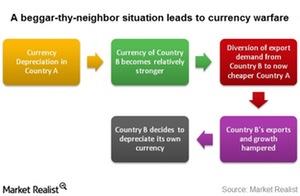Currency warfare: A ‘beggar-thy-neighbor’ situation
In a currency war, the “beggar-thy-neighbor” strategy is about increasing the demand for a nation’s exports at the expense of other countries’ export share.
Nov. 20 2020, Updated 3:46 p.m. ET

A “beggar-thy-neighbor” situation leads to currency warfare
“Beggar-thy-neighbor” is an economic concept where one country attempts to remedy its economic problems by means that tend to worsen other countries’ economic problems. In the context of a currency war, the “beggar-thy-neighbor” strategy is about increasing the demand for your nation’s exports at the expense of other countries’ export share.
It was a typical “beggar-thy-neighbor” situation. Depreciation in the currency of say, country A, would make the currency of neighboring country B stronger. This would divert demand from country B to country A—as the good becomes cheaper from country A. It would hamper exports, manufacturing, and eventually the growth of country B.
This leads to a currency war between countries. Each country seeks to devalue or depreciate their currency compared to the other currencies. Each country boosts its own exports and economic growth at the expense of the other countries’ growth.
 US quantitative easing led to a currency war
The Federal Reserve’s quantitative easing, or QE, program pushed up other countries’ currencies. It led to the origination of the term in 2010. Back then, the Federal Reserve’s QE policy to stimulate the US economy was in effect. It pushed up other countries’ currencies—compared to the US dollar (UUP).
However, the weakening of the dollar was boosting US exports while limiting imports. It diverted demand from the major trading partners to the US (SPY). A boost in export demand for the US benefits many major sectors in the US including energy, information services, automotives, industrials, and retail, among others. Within the industry, companies like General Electric (GE), Ford (F), and Hewlett-Packard (HP) stand to gain from an increase in export demand. A major portion of these firms’ revenue is derived from exports.
This is when major US trading partners decided to intervene.
Countries enter currency warfare to solve low growth
As a result, by 2012, Japan (EWJ), the United Kingdom (EWU), and Europe’s central banks all intervened in the currency market to make their currencies cheaper. With Shinzo Abe’s Abenomics in place, the Japanese (EWJ) yen declined by 50% against the Chinese yuan since 2013. Similarly, other countries are making their currency cheaper to gain export share. They’re exporting deflation. We’ll discuss the currency depreciation in these economies later in this series.
In the next part of this series, we’ll discuss how countries use currency warfare to export deflation.
